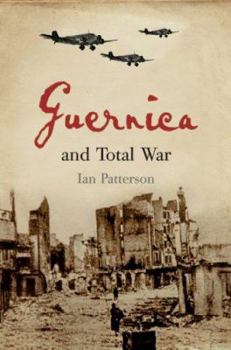Book Overview
One of the most horrific innovations of the twentieth century was the deliberate strategy of total warfare--the obliteration of entire civilian populations. The first and in many ways the most striking use of this extreme measure came nearly 70 years ago when the ancient Basque hilltop town of Guernica was destroyed by the bombs of the German Condor.
Format:Hardcover
Language:English
ISBN:0674024842
ISBN13:9780674024847
Release Date:June 2007
Publisher:Harvard University Press
Length:208 Pages
Weight:0.85 lbs.
Dimensions:0.8" x 5.8" x 8.5"
Customer Reviews
2 ratings
Guernica as a harbinger of an age
Published by Thriftbooks.com User , 13 years ago
Though on a small scale by later standards, the bombing of the Spanish town of Guernica on April 26, 1937 ranks as one of the iconic moments in the 20th century. Memorialized by Picasso in what is perhaps his most famous work, it was an event that shocked the West for the degree of death and destructiveness inflicted on a single, defenseless community. For many Europeans it symbolized their fears for what a new war would bring to the continent, and indeed in retrospect it also served as a precursor for the conflict that was soon to come. Ian Patterson's book about the bombing of the town is both more and less than a study of the attack, as he broadens his focus beyond the actual event to fit it into the context of its era. Patterson's focus is evident from the start, as he begins not with the bombing of the town but with how it was initially covered by the media of the time. This approach serves to demonstrate how the meaning of the event was contested from the start, as both the Republican and Nationalist sides in the Spanish Civil War present it as an example of their opponents' barbarity. Charged with launching the attack, the Nationalists denied any responsibility and instead accused the Republicans of attacking the village in an effort to galvanize public opinion against General Franco's forces. The images of the destroyed town, though, quickly took on a larger meaning, as they served as visual embodiments of the new type of war, one in which civilians suffered as well as combatants. From here Patterson brings in the larger context of the literature of the times about war, particularly war from the air. The limited use of air power against cities during the First World War created awareness of the threat, while the advances in technology and the warnings of experts served to magnify it. This anxiety was a consequence of the emergent concept of total war, where whole societies were now targeted by enemy forces as a means of waging war. Though the fears of the 1930s proved exaggerated in some respects, Guernica's fate was indeed one that would soon be inflicted on an increasingly escalating scale upon Rotterdam, London, Hamburg, Dresden, Tokyo, Hiroshima, Nagasaki, and others, all of which helped to cement Guernica's status as a harbinger for the decades that followed. Short yet enlightening, Patterson's book is a thoughtful examination of the bombing of Guernica and the broader meaning it held for his age. While his definition of total war (which he limits to the use fo air power to effect destruction) is rather narrow, his book nonetheless serves to illustrate how closely we have come to associating the concept with the devastation brought by the bombing of cities. This is a work that should be read not just by people seeking to learn about Guernica's destruction, but also by anyone interested in modern warfare and its impact on Western thought in the modern age.
Interesting look at Total war and "Strategic bombing"
Published by Thriftbooks.com User , 15 years ago
In this short but highly readable and potent book the author unwraps the meaning of total war and its real consequences in the modern history.Unlike the previously reviewer who harshly and unjustly trashed the book, I found the book's strong point is the author's presentation of various literary works that , if not perfectly, delivers how the so-called the concept of strategic bombing was closely related to sundry reception of the modernity. Especially strong part is the 2nd chapter. In which the author clearly and succintly juxtaposes Guilio Duhet's concept of strategic bombing and "Air-mindness" of Marinetti and its revolutinary aspect from the inception. I don't think the previous reviewer's claim is appropriate. first, the book's aim is showing the evolution of the concept of total war by means of aerial bombing. Not the kind of war waged by General Sherman. In fact, Sherman was only one of the many proponents of so-called total war. It is not terribly hard to find the ones planed and executed similar type of operations in history. A good example could be so-called Mongol hordes and their way of war that systematically and effectively demoralized the various countries by means of instilling fear to the hostile populations. Secondly, the author did not explicitly claimed "Total war did not work". In fact, he did not even try to show why it did not work. What the author tried to show in his chapter 2 to 3 is the predicted amaggedon type of disasters never really happened ,notwithstanding the bombing of civilian target , or so-called area bombing , inflicted heavy civilian casuaties. The book is short but the author intelligently presents the various reaction of first area bombing in European soil that such a mass fear among people.





